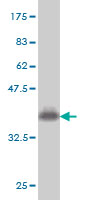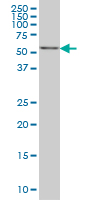CABC1 Antibody (monoclonal) (M05A)
Mouse monoclonal antibody raised against a partial recombinant CABC1.
- 产品详情
- 实验流程
- 背景知识
Application
| WB |
|---|---|
| Primary Accession | Q8NI60 |
| Other Accession | BC005171 |
| Reactivity | Human |
| Host | Mouse |
| Clonality | monoclonal |
| Isotype | IgM Kappa |
| Clone Names | 8F7 |
| Calculated MW | 71950 Da |
| Gene ID | 56997 |
|---|---|
| Other Names | Chaperone activity of bc1 complex-like, mitochondrial, Chaperone-ABC1-like, 2711-, aarF domain-containing protein kinase 3, ADCK3, CABC1 |
| Target/Specificity | CABC1 (AAH05171, 1 a.a. ~ 100 a.a) partial recombinant protein with GST tag. MW of the GST tag alone is 26 KDa. |
| Dilution | WB~~1:500~1000 |
| Format | Clear, colorless solution in phosphate buffered saline, pH 7.2 . |
| Storage | Store at -20°C or lower. Aliquot to avoid repeated freezing and thawing. |
| Precautions | CABC1 Antibody (monoclonal) (M05A) is for research use only and not for use in diagnostic or therapeutic procedures. |
For Research Use Only. Not For Use In Diagnostic Procedures.
Provided below are standard protocols that you may find useful for product applications.
BACKGROUND
This gene encodes a mitochondrial protein similar to yeast ABC1, which functions in an electron-transferring membrane protein complex in the respiratory chain. It is not related to the family of ABC transporter proteins. Expression of this gene is induced by the tumor suppressor p53 and in response to DNA damage, and inhibiting its expression partially suppresses p53-induced apoptosis. Alternatively spliced transcript variants have been found; however, their full-length nature has not been determined.
REFERENCES
ADCK3, an ancestral kinase, is mutated in a form of recessive ataxia associated with coenzyme Q10 deficiency. Lagier-Tourenne C, et al. Am J Hum Genet, 2008 Mar. PMID 18319074.CABC1 gene mutations cause ubiquinone deficiency with cerebellar ataxia and seizures. Mollet J, et al. Am J Hum Genet, 2008 Mar. PMID 18319072.The DNA sequence and biological annotation of human chromosome 1. Gregory SG, et al. Nature, 2006 May 18. PMID 16710414.Diversification of transcriptional modulation: large-scale identification and characterization of putative alternative promoters of human genes. Kimura K, et al. Genome Res, 2006 Jan. PMID 16344560.Towards a proteome-scale map of the human protein-protein interaction network. Rual JF, et al. Nature, 2005 Oct 20. PMID 16189514.
终于等到您。ABCEPTA(百远生物)抗体产品。
点击下方“我要评价 ”按钮提交您的反馈信息,您的反馈和评价是我们最宝贵的财富之一,
我们将在1-3个工作日内处理您的反馈信息。
如有疑问,联系:0512-88856768 tech-china@abcepta.com.























 癌症的基本特征包括细胞增殖、血管生成、迁移、凋亡逃避机制和细胞永生等。找到癌症发生过程中这些通路的关键标记物和对应的抗体用于检测至关重要。
癌症的基本特征包括细胞增殖、血管生成、迁移、凋亡逃避机制和细胞永生等。找到癌症发生过程中这些通路的关键标记物和对应的抗体用于检测至关重要。 为您推荐一个泛素化位点预测神器——泛素化分析工具,可以为您的蛋白的泛素化位点作出预测和评分。
为您推荐一个泛素化位点预测神器——泛素化分析工具,可以为您的蛋白的泛素化位点作出预测和评分。 细胞自噬受体图形绘图工具为你的蛋白的细胞受体结合位点作出预测和评分,识别结合到自噬通路中的蛋白是非常重要的,便于让我们理解自噬在正常生理、病理过程中的作用,如发育、细胞分化、神经退化性疾病、压力条件下、感染和癌症。
细胞自噬受体图形绘图工具为你的蛋白的细胞受体结合位点作出预测和评分,识别结合到自噬通路中的蛋白是非常重要的,便于让我们理解自噬在正常生理、病理过程中的作用,如发育、细胞分化、神经退化性疾病、压力条件下、感染和癌症。







